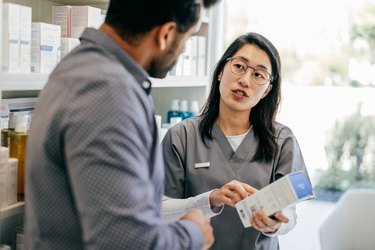
Your pharmacist would like to have a word with you before you swing by the drugstore to pick up your next prescription. Because if you're like most customers, you might be missing out on some important info about medication safety and savings.
For instance, up to a third of adults say they prefer pricier brand-name drugs to less expensive generics, notes Johns Hopkins University. And one February 2022 Frontiers in Pharmacology study reported that up to half of people surveyed say they regularly share their prescription meds with another member of their household.
Video of the Day
Video of the Day
But these moves are both mistakes, pharmacists say. And they're not the only ones that should be on your radar.
Read on to find out more about the snafus you want to avoid when it comes to your meds, and the expert advice on what to do instead.
Mistake 1: Sharing Your Meds
It might seem convenient to share some of your antibiotics with a family member when they seem to come down with the same bug you have, for instance. After all, you're saving them a trip to the doctor! But: "prescription medications should never be shared," says Jennifer Bourgeois, PharmD, SingleCare's health and pharmacy expert.
Your prescription could interact with other medications or supplements the other person might be taking, for instance. And even if they were to be prescribed the same medication, your dosage might be too strong for them or not strong enough.
So avoid sharing your meds. If a family member or friend thinks they need the same prescription as you, encourage them to see their doctor. If they need a medication quickly, encourage them to go to an urgent care, recommends Summer Kerley, PharmD, Director of Pharmacy and VP of Clinical Operations and Health Plan Solutions for Rite Aid.
Mistake 2: Not Asking About The Generic Option
Sometimes brand names are better — but that's not the case with prescription meds.
"Generic medications are cheaper than brand-name alternatives and can often provide significant savings on your medication expenses, while providing the same physiological effect," Bourgeois says.
Case in point? Medicare patients would have saved $161 million in 2017 alone if they or their doctors had requested generic prescriptions, concluded a March 2021 JAMA Network Open study.
Per FDA requirements, generic drugs must be the same as their branded counterparts with regards to safety, efficacy, dosage, form, route of administration, strength and labeling. But because they don't come with the same hefty price tag, they're often preferred by insurers, doctors and pharmacists.
"Patients should ask for generic options if they're having trouble affording their medications," Kerley says. "Even if there isn't a generic for the brand name the patient is currently prescribed, there may be an alternative therapy in the same medication class that does have a generic available."
Mistake 3: Not Being Up Front About Your Other Meds and Supplements
You should always let your doctor and pharmacist know about everything you're taking, including medications as well as natural supplements, herbs or vitamins (and even some teas).
Be prepared to share the medication format and dosage too, "including but not limited to tablets, capsules, liquids, inhalers and topical creams or ointments," Kerley says.
The experts aren't asking to be nosy. Meds and supplements can potentially interact, which could cause side effects or make your dosage less effective, Kerley warns.
When everyone on your care team knows what you're taking, they can take steps to make sure everything on your regimen will work together.
Mistake 4: Filling Your Meds at Multiple Pharmacies
"Some patients use multiple pharmacies for different medications," Kerley says.
For instance, you might get your blood pressure meds at one drugstore and get your chronic pain med at a different drugstore. But it's better to get every prescription from the same place, says Kerley.
That's because filling different prescriptions at different locations ups your risk for dangerous medication interactions that could make your treatments less effective or even cause harmful side effects, she explains.
If you absolutely need to use two different drug stores (because your insurance requires it, for instance), "always inform both pharmacists of your full medication list and be diligent in managing your medication intake as prescribed," Kerley says.
Mistake 5: Not Looking for Savings
Any time you start a new medication, it's worth asking the pharmacist whether there are options for snagging a discount on your drug costs.
"Prescription saving services, like SingleCare, are free and easy to use and provide discounts on thousands of medications," Bourgeois says.
Mistake 6: Not Taking Advantage of Preventive Care Services
Many pharmacies have more to offer than prescriptions, milk and birthday cards.
"Some patients may not know the significance of preventive care available in pharmacies, such as immunizations," Kerley says.
Not only is your pharmacy a convenient spot to stay up to date on your vaccines, but your pharmacist can help you figure out which jabs are especially important for you (like the flu shot or COVID-19 vaccine) and when they're needed.
"Patients with chronic conditions such as heart disease, diabetes, hyperlipidemia or lung conditions should review their immunization recommendations with their local pharmacist when picking up their medications," recommends Kerley.
Mistake 7: Running Out of Maintenance Meds
If you or a loved one need a certain med every day for a chronic condition, try to stay one step ahead to make sure you don't run out, because missing a dose could make the drug less effective or lead to side effects.
Bourgeois recommends taking advantage of automatic refills if possible, so you don't need to stress every time your supply starts to run low. If that's not an option, try to order your refill at least five days in advance.
"The five-day lead time allows pharmacists to order the medication and fill the prescription so it's available when the patient comes to pick up," Bourgeois says.
- Johns Hopkins Bloomberg School of Public Health: "Requests for Brand Name over Generic Prescription Drugs Cost the Medicare Program an Additional $1.7 Billion in a Single Year, Study Finds"
- Frontiers in Pharmacology: "Evaluation of Prescription Medication Sharing Among Adults in South Korea: A Cross-Sectional Survey"
- JAMA Network Open: "Factors Associated With Prescriptions for Branded Medications in the Medicare Part D Program"
- U.S. Food And Drug Administration: "Generic Drugs"
Is this an emergency? If you are experiencing serious medical symptoms, please see the National Library of Medicine’s list of signs you need emergency medical attention or call 911.


